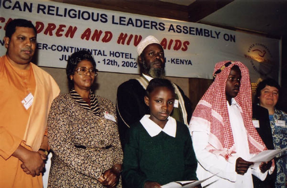Fighting the HIV/AIDS Epidemic by Coordinating Multi-religious Efforts for Orphans and Other Vulnerable Children
January 3, 2011Children have always been unwitting victims in the HIV/AIDS epidemic on the African continent. Orphaned, sick, and otherwise suffering from the consequential upheaval, they grow surrounded by pervasive instability. In many of these places, religious institutions been central to the public health battle against HIV/AIDS. With a shared history and enduring sense of kinship, places of faith and their communities have been tightly bound throughout history. The same holds true today.
Yet, aid efforts carried out by local religious institutions often go undetected. They are usually small scale and seldom linked to more visible aid agencies. However, by analysing and understanding this relationship it is possible to leverage it – and by doing so, to bring much-needed help to orphans and other children living in outbreak epicenters.
In the early 2000s, Religions for Peace led a movement to make that a reality. We convened more than 200 regional religious leaders, the United Nations Special Envoy for HIV/AIDS, and our partners in UNICEF, in an attempt to research and more fully understand that relationship – and its potentials. Our extensive report documents the quantity, quality, and scale of efforts faith-based organizations in Africa have pursued to care for children affected by HIV/AIDS.
That report helped foster greater understanding, and after securing $10 million of grant funding from the Bill and Melinda Gates Foundations, Religions for Peace and key partners moved to launch the “Hope for African Children Initiative.” Its goal: to provide encompassing assistance to at least 100,000 children impacted by the AIDS pandemic.
Our Interreligious Councils (IRCs) play key roles on the ground in all our efforts worldwide. They live, work, thrive, and suffer, with the local and diverse communities they serve. In carrying out this initiative, our IRC responsible for Africa created and managed nine smaller councils. Together, through multi-religious efforts, they fought to secure access to treatment for many, lobbied the government to enact new protections for orphaned children, and provided direct material support.
